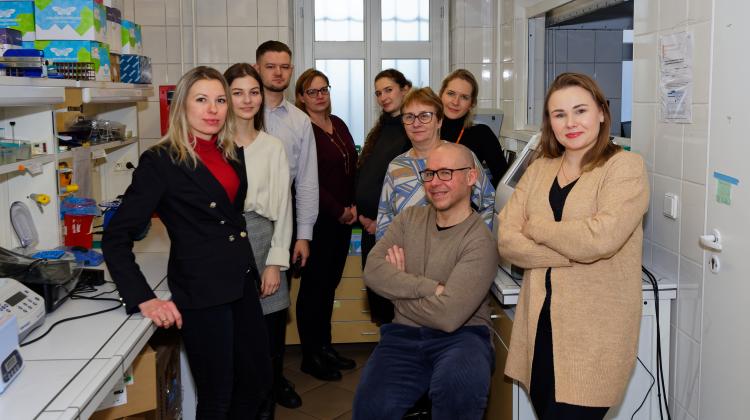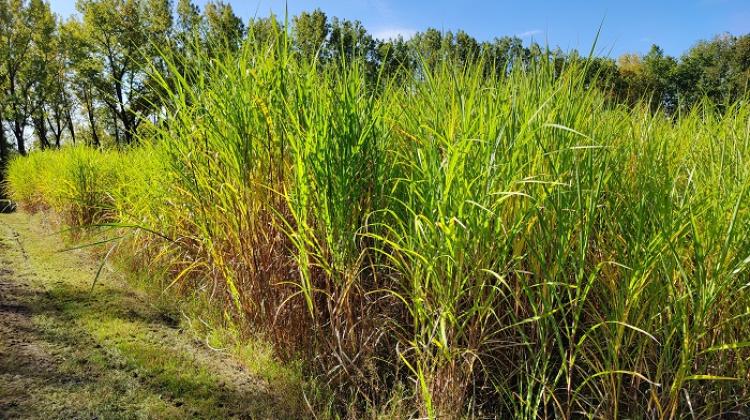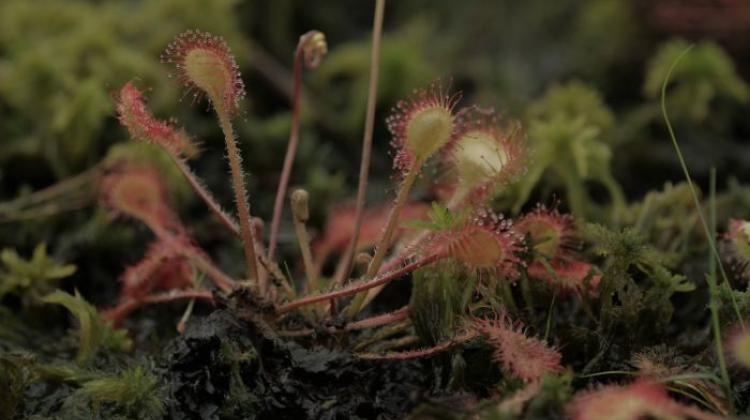Bacteria with potential for biological vaccines for plants
 Photo from Z. Piotrowska-Seget's archive. From left: Magdalena Noszczyńska, Iryna Bodnaruk, Piotr Siupka, Katarzyna Kasperkiewicz, Monika Malicka, Zofia Piotrowska-Seget, Małgorzata Rudnica, lower row: Franco Magurno and Małgorzata Pawlik
Photo from Z. Piotrowska-Seget's archive. From left: Magdalena Noszczyńska, Iryna Bodnaruk, Piotr Siupka, Katarzyna Kasperkiewicz, Monika Malicka, Zofia Piotrowska-Seget, Małgorzata Rudnica, lower row: Franco Magurno and Małgorzata Pawlik
Vesicles produced by endophytic bacteria act as messengers with a specific cargo load. Using this mechanism, it is possible to stimulate the plant to grow or provide it with tools to defend against pathogens. Research is conducted at the University of Silesia and the Maria Curie-Skłodowska University.
A group of microbiologists from the University of Silesia in Katowice and the Maria Skłodowska-Curie University in Lublin, as part of a grant from the National Science Centre, took a closer look at endophytic bacteria that colonize the inside of the plant without causing any adverse symptoms.
'The plant-bacteria relationship is symbiotic, and bacteria can benefit their host. Many studies show that in exchange for nutrient substrates, bacteria produce various types of metabolites, thanks to which the plant develops better or becomes more resistant to abiotic and biotic stress factors, such as pathogens', says project leader Professor Zofia Piotrowska-Seget from the Faculty of Natural Sciences of the University of Silesia.
Endophytic bacteria produce outer membrane vesicles (OMVs). These are microscopic (20-300 nm) structures with a spherical or close to spherical shape, built of a phospholipid bilayer in which various proteins of the outer membrane and lipopolysaccharide molecules are anchored. Their composition varies and depends on the species of bacteria and many environmental factors. DNA, RNA, proteins, peptides, lipids and secondary metabolites have been detected in the vesicles. They are produced both in optimal growth conditions for a given species and in stress conditions.
According to the scientist, OMVs can be treated as 'messengers' of bacteria. These vesicles reach the host carrying a specific cargo load, for example substances that stimulate plant growth or contain molecular patterns that are recognized by plant receptors and trigger mechanisms leading to the development of plant resistance to pathogens.
This role of the vesicles is of interest to the scientists involved in the project. The mechanism has the potential to use OMV as a platform for the production of biological vaccines for plants.
Scientists have noticed the possibility of creating a preparation based on vesicles, which could biologically stimulate the plant to grow and provide tools for its effective defence against harmful microorganisms. It would be a kind of vaccine that would immunize plants and at the same time not have a negative impact on the environment, as is the case with the long-term effects of pesticides.
'Ultimately, we would like to stimulate the bacteria to produce vesicles with the desired content. We could then introduce them into plants in the form of a vaccine to achieve a specific goal, such as greater resistance to various pathogens or other stressors', explains Professor Zofia Piotrowska-Seget.
OMVs' possible applications are not limited to biological plant protection. 'An interesting aspect is also the use of OMV to provide plants with important biologically active substances (hormones, enzymes) and to introduce RNAi molecules into plant cells that can mute certain genes, and thus increase tolerance, for example to abiotic stress. It should be added, however, that the development of effective methods for obtaining OMV with the desired properties and their implementation in agricultural practice will require much more research. It is necessary to thoroughly understand the mechanisms and factors determining the +packing+ of cargo into OMVs and the molecular interactions between receptors on the surface of plant cells and the vesicle membrane'', says Professor Zofia Piotrowska-Seget.
For now, scientists are focusing on basic research, funded by the National Science Centre. Their goal is molecular characterization of vesicles produced by two strains of endophytic bacteria of the genus Rhizobium and Pseudomonas.
The results of previous research conducted by Professor Zofia Piotrowska-Seget's team on maize and on the model plant Arabidopsis confirmed the possibility of stimulating the growth of both plant species with the vesicles produced by endophytic bacteria.
PAP - Science in Poland, Agnieszka Kliks-Pudlik
akp/ agt/ kap/
tr. RL
Przed dodaniem komentarza prosimy o zapoznanie z Regulaminem forum serwisu Nauka w Polsce.


















